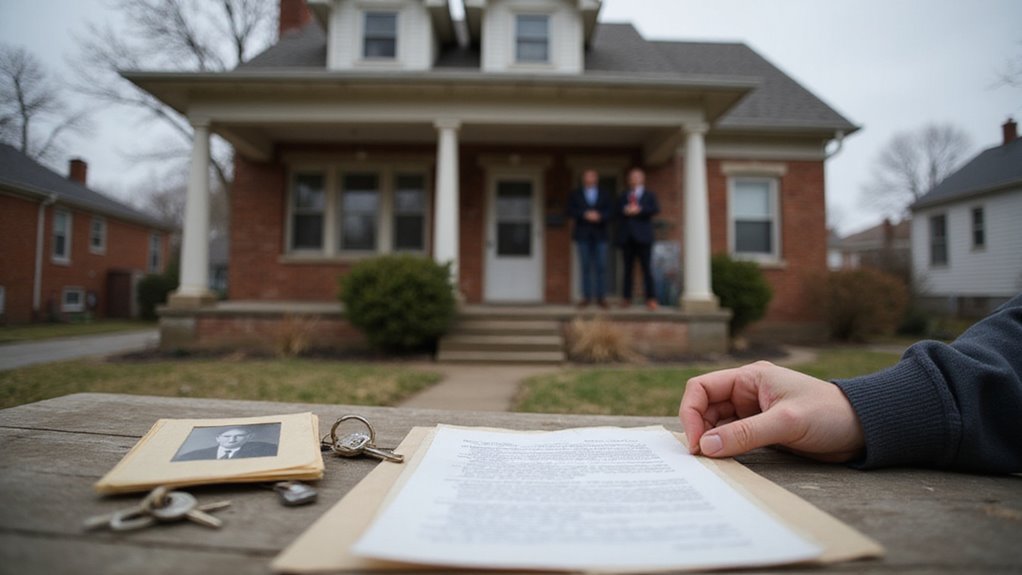Selling a House With Title Issues in Cincinnati




Selling a house with title issues in Cincinnati can be stressful and confusing. Title problems may include unpaid taxes, liens, or missing heirs. These complications often make buyers and agents nervous, slowing down or stopping your sale.
Buyers may walk away if they see title issues. Delays can cost you money and create legal trouble. Each mistake can lead to more paperwork and unexpected costs.
You can sell a house with title issues in Cincinnati, but you need the right steps and expert help. By knowing the process and your options, you can protect yourself and your sale. This blog will guide you through each step to solve your title problem quickly.
Table of Contents
Understanding the Probate Process

The probate process is a legal step needed when selling a house with title issues in Cincinnati. Probate verifies a will, names an executor, and allows the property to transfer from the deceased to new owners. If you skip this step, you may face delays or legal problems.
If the owner did not plan their estate, probate gets more complicated. Unpaid debts or missing heirs can slow everything down. These issues may add several months to the process.
Probate in Ohio usually takes six months to a year. The actual time depends on how complex the estate is. You must collect documents, prove ownership, and settle any debts or liens.
Understanding probate helps you avoid legal trouble and protects your money during the sale. Mastering each step makes the title transfer faster and easier. Probate is a key part of any real estate transaction involving a deceased owner.
Cincinnati Probate Requirements
When selling a house in Cincinnati with title issues, you’ll need to navigate specific probate requirements, including court procedures, statutory timelines, and mandatory legal documentation. As an executor, you’re responsible for adhering to these regulations to avoid delays or legal disputes. Understanding these requirements helps you streamline the transaction and protect your rights throughout the process.
If you want to sell a house in Cincinnati that is in probate, you must follow Ohio’s court rules. The court manages the estate and must approve the sale. You need legal permission before you can transfer the property’s title.
You must file a petition with the court to start the process. The court checks that all debts are paid and creditors are informed. If you skip any step, the judge may delay the sale. An official appraisal and a full list of assets are required. All documents must meet court standards and deadlines.
Timeline Expectations
Legal Documentation
Executor Rights
Selling a house in Cincinnati probate usually takes at least three to six months. This period covers court deadlines, notices, and estate planning steps. Complex cases may take longer.
Title problems, like liens or debt, can slow the process. If ownership is unclear, title clearing may add months. Hamilton County data shows simple cases often finish in under six months.
If documents are missing or disputes arise, probate may last over a year. Proper estate planning before death can help avoid delays. Always check for title issues early, as these can cause setbacks.
Managing probate in Cincinnati means collecting the right legal documents. You need a certified death certificate, the will if there is one, and a probate petition for the Hamilton County Probate Court. Original title deeds are also necessary to prove ownership.
Title deeds help confirm the property’s ownership history. If there are title problems, these documents are especially important. Proper paperwork helps avoid delays and gives buyers confidence.
Title insurance can protect you and buyers from hidden title issues. If you secure title insurance, you lessen the risk of future legal problems. Accurate records and insurance make the property more appealing to cash buyers.
Executor rights allow you to manage the estate under Cincinnati probate rules. You oversee paying debts, collecting assets, and distributing property. If there is no will, Ohio law guides the process.
An executor can list and sell real estate if needed. You must get court approval before transferring property, especially if there are title problems. The court requires a full report on each transaction.
You should work with legal and title experts to fix any liens or title issues. Hamilton County Probate Court data shows that prompt filing and clear paperwork can reduce delays by up to 40%. Proper use of executor rights helps speed up estate administration and property sales.
How to Sell During Probate
When you’re selling a house in probate, you’ll need to secure court approval, obtain a certified property valuation, and follow strict marketing guidelines. Data shows Cincinnati probate courts require documented buyer qualification before any sale proceeds. Understanding each step ensures you comply with local regulations and maximize asset value. The court approval process is required when selling a house in probate. This process makes sure the sale follows Ohio probate laws. The court checks that all steps are legal and fair for everyone involved.
You must submit a petition to the probate court to start the sale process. The court will review all estate documents before giving permission. If the documents are not in order, the court may delay the sale. Ohio law requires you to notify all heirs and interested parties about the sale. This ensures everyone knows what is happening and can raise concerns. The process promotes fairness and transparency.
The court will order the sale only if you show the house’s fair market value and clear title. Without proper value or title clearance, the court may reject your request. The sale must happen under the court’s supervision. Court oversight helps protect heirs’ rights and ensures the money from the sale is distributed correctly. If any disputes arise, the court’s involvement minimizes future legal problems. Following these steps helps complete the probate sale smoothly.
Property Valuation
Marketing Requirements
Buyer Qualification
Property valuation tells you how much a house is worth during probate in Cincinnati. Ohio courts need proof that the price is fair. A certified appraiser usually gives this valuation.
The appraiser looks at the home’s condition, recent sales, and trends in the area. This helps make sure the price matches the market. If you use a market analysis, it gives reasons for your price in court.
You must present the appraisal to the probate court as evidence. This protects you from disputes and legal issues. If you keep good records, the court process will go more smoothly.
Ohio probate law sets clear marketing rules when selling a house in probate in Cincinnati. You must follow these rules to ensure a fair sale. The court wants open marketing so the property can get the best price.
All marketing materials must state the house is in probate and mention any title issues. If you do not disclose this, you could face legal problems. Honest advertising builds trust with buyers.
You should use many ways to advertise the property, such as MLS listings, newspapers, and online sites. These methods help more buyers see the house. If you want faster sales, focus on buyers who know probate sales, such as investors.
Keep detailed records of every ad or listing you create. The court may ask for proof you followed the rules. Good records show you acted properly during the sale.
To ensure a buyer is qualified when selling a house during probate in Cincinnati, check their finances first. Ask for proof of funds or a pre-approval letter from a trusted lender. Confirm they understand that court timelines can change.
If a buyer has dealt with title issues before, they may handle problems better. Cash buyers, like Prestige Investments Cincinnati, can make sales easier when title issues come up. Always ask for an earnest money deposit to show the buyer is serious.
A qualified buyer should follow all probate rules and work to resolve title problems quickly. If these steps are met, the sale is more likely to succeed. Taking these precautions reduces risks and helps avoid delays.
Legal Considerations in Probate Sales
When selling a house in probate, you need to address heir rights, tax implications, court supervision, and statutory distribution rules. Ohio law mandates strict adherence to these requirements to ensure proper title transfer and compliance. Failing to follow these protocols can delay the sale and expose you to legal liability.
Heir Rights
Heir rights in a probate sale decide who gets property after someone dies. Ohio law sets the rules for this process. Heirs are named in a will or chosen by Ohio’s intestate succession laws if no will exists.
Disputes may happen if more than one person claims the property. Courts use state laws to resolve these issues. If you are an heir, you should know the legal steps and requirements.
Each heir must prove their relationship to the deceased with documents. All possible heirs must get notified in the time set by Ohio law. If disagreements come up, they must be settled before a sale can move forward.
Tax Implications
Tax implications for probate sales in Ohio involve both federal and state rules. Sellers may face capital gains taxes and, in some cases, federal estate taxes. Ohio does not have a state inheritance tax.
The IRS uses a stepped-up basis to calculate capital gains tax. This means you pay tax only on the difference between the sale price and the property’s value at the owner’s death. You need to keep records of all transaction values.
Federal estate tax applies only if the estate is worth more than $13.61 million in 2024. If your estate is below this amount, no federal estate tax is due. If unsure, you should consult a tax professional.
A tax professional can help you reduce liabilities and stay compliant during probate sales. Proper planning may help you avoid costly mistakes. Always seek expert advice before making decisions.
Court Supervision
Court supervision is a required part of probate home sales in Ohio. The court makes sure all rules are followed when selling a property. It protects both buyers and sellers during the process.
The court checks that the title is clear and belongs to the estate. It must approve the sale before it is final. If there are problems with the title, the court helps resolve them.
Estate representatives must report each step of the sale to the court. The court enforces duties to lower the chance of disputes. If you follow court rules, the sale is less likely to face legal issues.
If you are planning your estate, court supervision can affect how quickly assets are transferred. It ensures assets are handled according to state law. If you want a smooth process, strict compliance with court orders is key.
Distribution Rules
When a probate sale in Ohio reaches the distribution stage, the court sets clear rules for dividing money. These rules decide who gets paid first and who receives any remaining funds. Executors must follow these steps to avoid legal problems.
Creditors and taxes get paid before heirs can receive anything. If there is a will or trust, it explains who gets what. If there is no will, Ohio law decides how to split the money.
Mistakes during this phase can cause lawsuits or make the executor personally responsible. Executors should carefully review the order of payments. Here is the order used in Ohio probate sales:
| Priority | Description |
|---|---|
| 1. Secured Creditors | Mortgage lenders, tax liens |
| 2. Unsecured Creditors | Credit cards, medical bills |
| 3. Administrative Costs | Attorney, executor, court fees |
| 4. Heirs/Beneficiaries | Named in will or chosen by Ohio law |
Submit Your Information Below For A Cash Offer On Your Property
Managing Probate Property
When you’re managing probate property, you must address maintenance requirements, update insurance policies, and implement robust security measures to protect the asset. Neglecting these responsibilities can lead to increased costs, code violations, or even insurance lapses, which statistically impact sale timelines by up to 30%. Prioritizing cost management ensures you maximize value and streamline the probate process.
Maintenance Requirements
Ohio law says you must maintain a probate property, even if it is empty. If you do not maintain it, you could get code violations or fines. Proper upkeep also protects the property’s value and keeps neighbors happy.
Basic care includes mowing the lawn and trimming bushes. You should fix broken windows and repair damaged siding. If the exterior looks neglected, city officials may issue fines.
Clean the house often to stop mold and keep it looking nice. Secure all doors and windows to keep out trespassers. If you want to sell, staging the home can help attract buyers.
Good maintenance makes selling the property easier. If you keep up with repairs, buyers will have a better first impression. This can help you sell faster and avoid legal trouble.
Insurance Needs
Proper insurance is very important when managing a probate property in Cincinnati. Insurance protects the estate’s value from unexpected losses. If there is no insurance, you risk losing money due to fire, water damage, or other claims.
Insurers need to know the property is in probate. If you do not tell them, they may deny your claim. Most insurers also require you to provide updated documents during probate.
If the property title is not clear, insurance claims can be delayed or denied. You should clear up any title issues as soon as possible. Without this, the estate may struggle to recover its value.
Keeping good records and getting full insurance coverage helps protect the estate. This approach reduces risks and makes transferring the property easier. Always check with your insurer about their requirements during probate.
Security Measures
Vacant probate properties are more likely to face theft and vandalism. Good security measures help protect the estate’s value and title insurance eligibility. If you secure the property, you lower the risk of crime.
You should install security systems with real-time alerts. Regularly inspect the property and keep records of each visit. Secure all doors and windows with strong locks. Exterior lights and clear signs can help scare off trespassers. If you follow these steps, you help keep the property safe for future owners.
Cost Management
Cost management is essential after you secure the property in probate. It helps maintain the estate’s value and avoid extra costs. Careful planning ensures a smooth property transfer.
A title search should be your first step. This search finds any liens or problems with the title. Fixing these early prevents delays and unexpected legal bills. Title insurance is a smart investment. It protects you from future claims against the property. If an issue appears after the sale, insurance covers the costs.
Ongoing costs like property maintenance, taxes, and insurance should be tracked. These expenses can lower the estate’s value if ignored. Regular reviews help you stay within budget. If you review local real estate trends, you can set a fair sale price. This reduces how long you hold the property and limits extra costs. Good cost management supports a faster and more profitable sale.
Markets We Buy Houses In
Simplify Your Probate Sale with Prestige Investments Cincinnati Can Help
Managing a probate sale in Cincinnati can be confusing and time-consuming. Prestige Investments Cincinnati makes the process easier for you. Our team helps you handle probate sales quickly and with less stress.
We know Ohio probate laws and use simple methods to speed up your sale. If you work with us, you avoid long waiting times and complicated paperwork. We manage all legal documents and court filings for you.
You do not need to fix up the property or pay extra fees. We give you a fair cash offer based on the current market. There are no commissions or hidden costs.
If you want a smooth and clear probate sale, contact Prestige Investments Cincinnati. We focus on making your experience straightforward and efficient. Let us handle the details so you do not have to worry.
Selling a House With Title Issues in Cincinnati: Frequently Asked Questions
Do I need a lawyer to sell my house in Ohio?
You don’t have to hire a lawyer to sell a house in Ohio—even if you sell without a realtor. But many sellers still hire one to review contracts, help with paperwork, and avoid legal mistakes. It typically costs between $159–$318 per hour.
What takes the longest when selling a house?
In Ohio, most time is spent between listing and closing. Homes stay on the market about 37 days, then closing takes another 35 days. That means it takes around 72 days total from listing to handing over the keys.
What month do houses sell best?
Nationwide and in Ohio, May is the best month to sell—data shows homes listed in late May get about 1.6 % more, sometimes $5,600 extra. Spring through early summer brings the most buyer activity in Cincinnati too.
What are the worst months for sales?
For Ohio sellers, January is the worst month to list. Homes take much longer—about 64 days—and prices tend to be lower. Also October to December tend to bring fewer offers and slower sales overall.
What is the best day to make a sale?
Studies find Thursday is the most popular day to list, often resulting in faster sales and sometimes better prices. Wednesdays and Fridays also perform well in many markets, including Ohio.
How long does it take to get better at sales?
New salespeople usually improve in 3–4 months. To become highly competent or top‑tier takes about 9–15 months. Some report reaching the top 10% in 12–18 months with the right training and practice.

